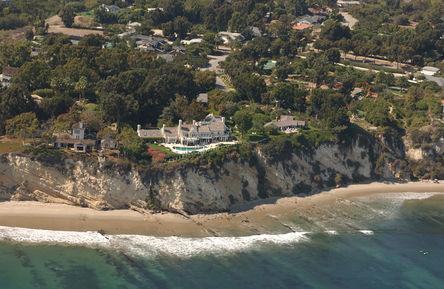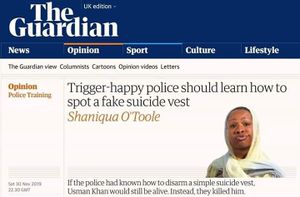Streisand effect
 The image of Barbra Streisand's house she tried, and so spectacularly failed to censor from the internet. | |
| The phenomenon of counterproductive efforts to remove material which is already online. |
The Streisand effect is the phenomenon whereby attempts to carry out internet censorship are counterproductive - resulting in drawing more attention to the information.
Contents
Origins
The phrase was coined by Mike Masnick of Techdirt.[1]
"How long is it going to take before lawyers realise that the simple act of trying to repress something they don't like online is likely to make it so that something that most people would never, ever see (like a photo of a urinal in some random beach resort) is now seen by many more people? Let's call it the Streisand Effect.[2]
Before Streisand filed suit, "the picture had only been viewed/downloaded six times, two of those times by Streisand's attorneys. Following news of the suit, the picture was downloaded over 420,000 times."[3]
Selected examples
In 1999, Richard Tomlinson sought to publish a list of 117 MI6 operatives on the internet. Rather than deny it, the UK Foreign Office sought to censor it. Duncan Campbell wrote a few days later:
"The British Government moved to silence the national media. Using the D-Notice system that Australia similarly enforced, Rear Admiral David Pulvertaft warned editors that 'a US-based website has today published on the Internet a list which identifies a large number of SIS (MI6) officers. Departmental officers are examining how the damage of this disclosure can be minimised. While this is in progress, I would ask that editors do not interpret the information in the website as being widely disclosed and do not, therefore, publish the address or the content of the website'." Duncan Campbell wrote a week later that "The folly of the decision sank home in London this weekend as officials watched the list from Executive Intelligence Review (EIR) spread across the world."[4]
TrollingTheGuardian
In December 2019 The Guardian used the DMSA to request takedown of a parody posted on Twitter. After Twitter closed an account a multitude of similar pieces followed, sharing by the hashtag #TrollingTheGuardian.
Blue Anon
In 2021, "Blue Anon" trended to the top of Twitter following a purging of the term from Urban Dictionary and Google.[3]
Aimee Challenor
"Let's Go Brandon!"
- Full article: “Let's Go Brandon!”
- Full article: “Let's Go Brandon!”
The phrase "Let's Go Brandon!" entered into history in October 2021 when an inventive ad hoc attempt by a sports presenter to hide the crowd's noisily expressed disrespect for Joe Biden failed spectacularly, spawning a new rallying cry.
Exploitation
Anthony Shaffer promoted the 9-11 Official opposition narrative in the first edition of his memoirs. Supposedly in an effort to suppress this, the US DoD bought and destroyed over 99% of the first print run, but some copies escaped. The commercially-controlled media has since published passages which were redacted in subsequent editions. This exercise may have been an attempt to use the Streisand effect to promote the 9/11 official opposition narrative about "intelligence failures".
Related Quotation
| Page | Quote | Date |
|---|---|---|
| "Let's Go Brandon!" | “the phrase and meme are fast becoming the most censored words of 2021, yet still entire stadiums of fans at sports games now regularly in unison shout Let's go Brandon ...even at high school or college games.” | 20 December 2021 |
Related Document
| Title | Type | Publication date | Author(s) | Description |
|---|---|---|---|---|
| Document:I've Been Banned From Facebook for Sharing an Article About False Flags | article | 17 November 2017 | Caitlin Johnstone | Caitlin Johnstone's account of her Facebook censorship experience. |

